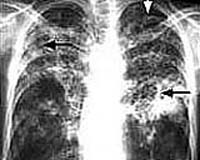 TB cases have steadily decreased over the past 10 years in the United States, falling to 13,767 last year. |
by Rosalie Westenskow
Controlling tuberculosis requires a massive effort, and although many communities effectively track and treat the disease, success relies heavily on patient cooperation, experts say. In the aftermath of the highly publicized Andrew Speaker incident -- an Atlanta attorney who traveled across the Atlantic and back while infected with a rare strain of TB -- leaving compliance largely in the patients' hands may seem overly risky to some.
As an airborne disease, TB can spread rapidly if infected individuals fail to receive proper treatment. Treatment involves extensive therapy, and, if patients don't complete the entire regimen, the disease comes back -- often in a form resilient to traditional antibiotics.
As a result, local governments have stepped in and created TB-treatment programs to help stem the tide of infections.
States must strike a tricky balance between patients' rights and general welfare, however, said James Hodge Jr., executive director of the Center for Law and the Public's Health at Georgetown and Johns Hopkins University, during a panel discussion Monday hosted by the National Association of County and City Health Officials.
"Let's be sure to do what we can to protect the public's health while perpetuating a principle of volunteerism," Hodge said. "People with tuberculosis have committed no crime."
Each state has its own laws outlining the government's role in the process. Georgia, for instance, takes a less heavy-handed course of action.
"You see in Georgia a very consistent approach to respect the liberties and interests of the patient first," Hodge said. "At some juncture, a written order can be issued" mandating the patient's compliance.
But that action wouldn't occur until authorities felt certain the individual would not voluntarily participate.
"That's a last-ditch effort," Hodge said.
California, however, encourages greater legal intervention.
"What you see here is a strong concentration in local health authorities and the law to protect the public's health," Hodge said.
Authorities in California may issue orders to isolate patients during the contagious stage or mandate participation in therapy programs.
Relying on voluntary compliance works most of the time, said Hodge, calling Speaker, who took a commercial flight back to the United States against the requests of health authorities, an "outlier case."
However, some states should reexamine their stance on TB, said Karen Smith, public health officer for Napa County, Calif.
"There are some states that haven't looked at their legislation in a very long time and these are the states that might have significant pieces missing" which would impede local health officials, Smith said.
TB control comprises a major collaborative effort in any community, she said, and involves correct diagnosis of the disease as well as treatment.
"It's our responsibility to ensure local healthcare providers know when to suspect TB and how to accurately diagnose it," she said. "The healthcare provider also needs to know how to report both confirmed and suspected TB patients to the local TB program."
The TB program in Napa County, where Smith works, also must assist patients in overcoming numerous treatment barriers, including homelessness, transportation needs and mental health issues.
In addition, staff provide a support system to help patients get through the time-consuming treatment, which lasts six months to a year.
TB cases have steadily decreased over the past 10 years in the United States, falling to 13,767 last year. However, a decrease in funding could pose a threat to progress, said Michael Fleenor, chair of the Advisory Committee on Tuberculosis at the Centers for Disease Control and Prevention.
"There is a direct correlation between rates of TB in this country and the efforts, through funding, given to stop it," Fleenor said.
In 2006, Congress approved $138 million for TB mitigation, almost half of the $252.4 million the National Coalition for the Elimination of Tuberculosis estimates would be required to fully fund the country's TB control programs. This year's appropriation is expected to be 5 percent less than the 2006 figure.
This could mean bad news for the treatment of multi-drug resistant (MDR) or extensively drug resistant (XDR) strains of the disease.
"There's some indication that there's a beginning of an upturn in tuberculosis (cases), including MDR and now the spectrum of XDR TB," Fleenor said.
While treatment for a normal TB case costs about $6,000, a multi-drug resistant strain pushes the bill up to at least $25,000 and an extensively drug resistant case packs a $500,000 punch.
"That one case could drive the local health department to its knees," Fleenor said.
Original article posted here.























No comments:
Post a Comment